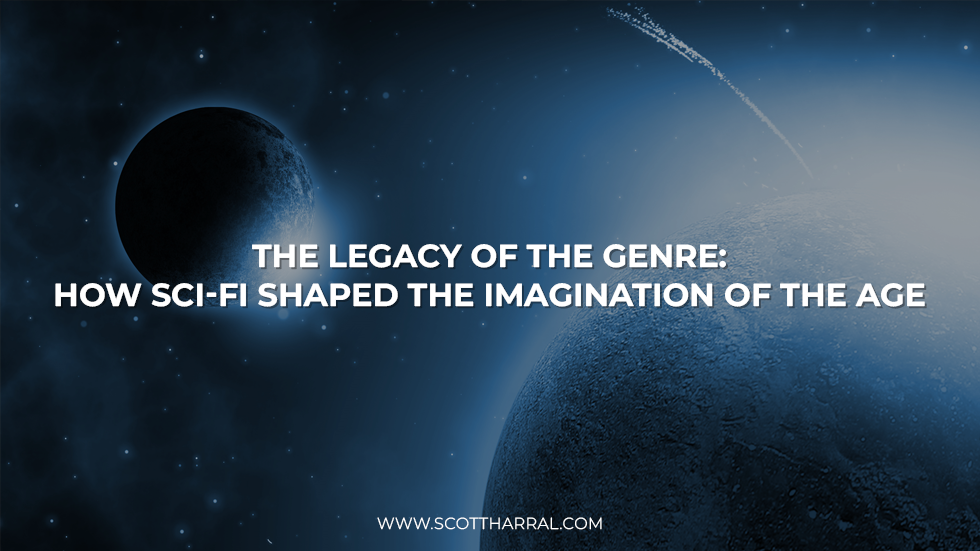The Legacy of the Genre: How Sci-fi shaped the Imagination of the Age

The legacy of the SF is conjured by the extraordinary vision for the future, which is the epitome of the genre. The genre’s golden age dates back from the mid-1930s to the late 1950s after Pulp fiction became a sensation in 1920. Over time, Sci-Fi became a constant in the lives of today’s generation.
Why do we read science fiction?
Perhaps more than any other fiction genre, Sci-fi is often written with a social purpose or a goal. Writers in this genre often bewail the vanity of trying to predict the future in their more metafictional works. Instead, science fiction is written to caution against the horrors of war, death, and other humanistic dilemmas that glorify human ingenuity. Like Moon Luck by Wayne Scott Harral. The book not only focused on the typical gest of science fiction but also explored the other dimensions of the human mind. Mr. Harral’s insight isn’t like the other. His imagination overflows with brilliance and enigma, which would set you on fire and reread it. A kind of book which demands critical thinking and reflection; a clear example of how science fiction must be read.
Furthermore, Science Fiction readers must seek something reflective, stimulate motives, and rebuttal the reality. So really, why do we read science fiction? The most straightforward answer is escapism: being into a more fun world than humdrum reality. To in the situation where you can reflect while being amazed by the imagination poured by the writer. Something worthy of your time.
But, when did it all begin?
The great spectacles of every era lie in its imaginations. During the time of the Post-Socratic age, the fiction of the people heavily relied on myths and astronomical phenomena, and it continues during the time of the Pre-Socratic age, where thinkers such as Philosophers, Mathematics, Astronomers, Doctors, Legislators heavily relied on the systems that forged their thoughts and approach in the discipline.
The cosmology of the ancient times handed ideas that were essential for the upcoming eras, especially in astronomy. Most of the modern concepts stemmed from the concepts of ancient Greek Cosmology. Ancient Greek cosmology started from Miletus in the fifth century, a city on the coast of the Aegean Sea.
As one of the most robust cities during that time, it thrived in its various postulations. Moreover, the city is well-known for its scientific, philosophical, and literary, and all came from Milesian schools. It is where it all began; the revolution of thinking thrived and prospered. The Milesians understood that it could change their world as they pondered it through reasoning and direct observation. The so-called empirical replaced the earlier narrative with an understanding of how the world came from nothing into something and how it works. But that doesn’t mean that the tradition of imagination vanished – other genres seriously came to being within this new progression of human thinking. Some thinkers that went from the Milesian School developed even more different and sophisticated approaches to observation beyond experimental by opting for an imaginative attitude through the creation of hypotheses. It was the physicist Thales who manifested this. Thales, Anaximander, and Anaximenes, three of the seven sages of ancient Greece, undoubtedly changed the course of their time. These three Milesian thinkers were the builders of the discipline of cosmology, soon unifying philosophical thinking in pre-Socratic times and scientific theory. A new system of thought started in the cosmos.
The most incredible imagination known to have inspired the science fiction genre was One Thousand and One Nights. Other dated back to medieval literature, where the idea of a being heavily inspired the thinking of that time as the creator of “God.” Another was from Proto-science fiction from the Enlightenment and Age of Reason era. In the 19th-century, the transitions and the system of thought began to flourish. Shelley’s Frankenstein was a notable book during that time. In this year also, H.G Wells wrote his two books: The Time Machine and the Invisible Man.
The Early 20th century is the birth of Pulp Fiction and modernist writing. During this era, science fiction became well-known to the mass audience. The birth of mainstream publishers paved the way for the genre to reach its golden age. Many writers wrote magnificent and thrilling works of fiction, and people consume every ounce of words on paper. The spread of cyberpunk to other parts of the marketplace’s ideas marks the beginning of the contemporary age of science fiction. Above all, cyberpunk has influenced films, anime, and the emerging medium of video games.

